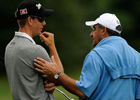'What Happened?'
Tiger Woods needs a heart-to-heart with Tiger Woods

I will never forget the sound of Tida Woods' voice piercing through the recording of the 911 call of Nov. 27 at the start of her son's public nightmare.
As Tiger lay next to the SUV he had just crashed, his mother's throaty wail was demanding, disbelieving and, most unsettling from such a strong woman, scared.
Of course, the question she posed endures almost a month later, and will for many more to come: How could all that "what happened" have happened to Tiger Woods?
Weeks later, after Woods acknowledged his infidelity and announced he was taking an "indefinite break" from the game, I kept going back to the beginning. I first met Tiger in 1990 in the parking lot at Coto de Caza, a Southern California course not far from his family home. I was doing a profile for Golf Digest on Woods, then a 14-year-old prodigy, who in short order would win three consecutive U.S. Junior Amateurs. He arrived with his father, whom I had spoken with on the phone. Earl was friendly and informal. He called me "Stud," which seemed odd on several levels, but not after I got used to his chauvinistic Army humor. After shaking hands, Tiger hung back, barely saying a word.
In retrospect, he was the Tiger I still know: reserved and wary. I quickly sensed that he had gotten used to more than just media people wanting something from him, and he was already growing tired of it. Plus, he was focused on displaying his best for what would be his first big national magazine story. He had his game face on.
He was a bit tight at first, but he hit breathtaking shots, and when he saw how I "got" him as a golfer and student of the game, he became Tiger at his most charming: bright, curious, innocent and seemingly eager to connect in the way of an only child.
After the round, the three of us stopped at an all-you-can-eat buffet, Tiger's choice. He had many questions, a lot of them about the media. As I made the case for maintaining an open dialogue, he listened impassively. Then he asked, with a pained expression, "Why do they have to know everything?"
Tiger Woods had already figured out that they don't. He was already constructing a life apart -- certainly from the public, but also from anyone who inhibited him from the things he wanted to do. As close as he and Earl were, the father knew Tiger was a kid who by temperament and especially circumstance needed plenty of personal space. For as much as Earl tried to balance the myth-making of his son -- beginning with "The Mike Douglas Show" and "That's Incredible!" -- with an intimacy and openness that any father would envy, Tiger early on felt owned by the public, and in reaction became fiercely independent. The focus and drive that complemented his talent is what made him a transcendent genius. But those same qualities, employed in rebellion, would also foster a personal coldness and a dread of public scrutiny.
Although his wide smile and sheer joy in playing kept me from seeing it right away, he was a kid with a burden. For one, he was clearly the only source of his parents' happiness in an otherwise uneasy marriage. Both Earl, who had been distant from his first wife and their three children, and Tida, who grew up a lonely child of divorce, gave their all for Tiger, but it was the only place their lives intersected. By the time Tiger began playing the tour, his parents were living in separate houses.
Earl in particular couldn't refrain from portraying his son as perfect. The litany was long, with relatively small pronouncements, like Tiger never playing golf until he had completed his homework, to bigger ones, like Tiger being "incapable" of lying, to the supersized: Tiger would be more important than Gandhi. An oft-repeated phrase is one I heard at our first meeting: "I'm very proud that Tiger is a better person than he is a golfer."
Perhaps Tiger's greatest accomplishment is that by force of talent and will, and perhaps his attempt to enhance his parents' relationship, he continued to live up to the impossible claims. He won everything as a junior, became the only male to win three straight U.S. Amateur titles, was a good student at Stanford, then embarked on a professional career that soon had him tracking Jack Nicklaus' record for major championships. Tiger was special. Former cynics would sing in unison, "Earl was right."
Woods became golf's Atlas, carrying everything -- the PGA Tour, his near-flawless image as a role model, his foundation, his family; heck, the game itself -- on his shoulders, all on top of the unceasing pressure to perform.
- Keywords:
- pga,
- jaime diaz,
- Jaime Diaz,
- Tiger Woods,
- Earl Woods,
- Tida Woods






































